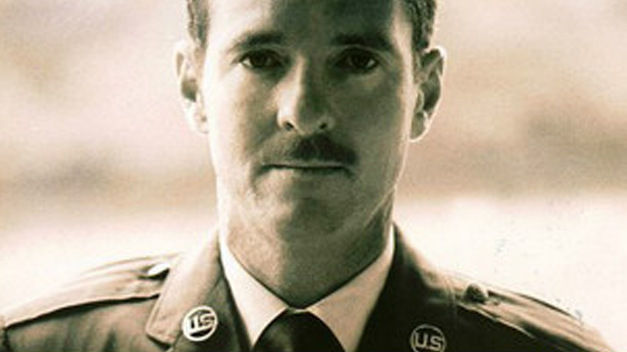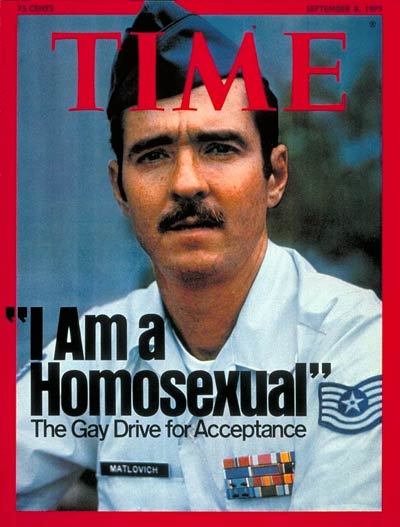On this day September 8th, in 1975, US airman and Vietnam veteran Leonard Matlovich became the first serving member of the US military to purposefully ‘out’ himself. Matlovich also became the first openly gay person to appear on the cover of a major weekly magazine in the USA.
The groundbreaking issue of TIME magazine revealed Matlovich as a serving member of the US forces who was declaring that he was gay. It made the serviceman one of the most well know gay people in America, next to politician Harvey Milk.
Matlovich worked in the Airforce teaching incoming servicemen that racism was not acceptable within the forces, and he saw a lot of parallels between racism and the discrimination of gay people.
Matlovich officially informed his superiors of his sexuality to create a test case about discrimination within the military. Matlovich was honourably discharged from the service.
Commenting on his discharge Matlovich said,”Maybe not in my lifetime, but we are going to win in the end.”
It would be another 36 years before the USA military removed all forms of discrimination from their rule book.
He went on to volunteer on many gay rights campaigns and following his diagnosis of contracting HIV, he became a vocal campaigner for the rights of positive people.
He passed away, aged just 45, in March 1988. He was buried at the Congressional Cemetery and his tombstone states the famous quote;
“When I was in the military, they gave me a medal for killing two men and a discharge for loving one.”
It’s not surprising that Leonard Matlovich chose a career in the armed forces, he grew up on US miilitary bases around the globe including spending time in Georgia, Texas, Guam, Pennsylvania, Alaska, South Carolina and a stint in the United Kingdom.
He joined the air force in 1963 eager to serve in Vietnam, but he was not deployed to the conflict until 1965. His first tour of duty saw him spent time working as a radar builder on in Vietnam, and he also spent time based in Thailand and The Philippines.
After briefly leaving the military he re-enlisted and returned for a second stint in Vietnam where he was based in Da Nang.
During this time he abandoned his Catholic faith and converted to Mormonism. Two weeks before he was due to return to the USA he was struck by a landmine and then spent months in hospital recovering from his injuries.
After a long recovery in 1970 he transferred to the air force’s cartography unit. He later returned for a third tour of duty in Vietnam but this time away from the front lines. He was also awarded the Purple Heart for the injuries he’d sustained the previous year.
Upon returning the USA he trained to be a counsellor in the military, tasked with improving race relations. Matlovich developed a bold program to tackle racism, inspired by the work of diversity educator Jane Elliot.
The process made Matlovich think about his own attitudes towards race, and also his feelings about his repressed homosexuality. Slowly he began to venture out to gay bars and meet other gay and lesbian people. He also got in touch with activist Frank Kameny, who had founded the Washington branch of the national gay rights organisation Mattachine Society.
Kameny and his organisation were searching for the perfect case to test the government’s ban on homosexual people serving in the military. They were searching for a serviceman with an impeccable record who could declare that their sexuality did not affect their ability to undertake their role.
On March 6th 1975, Matlovich nervously delivered a letter to his immediate superior declaring he was homosexual.
The air force’s response was to immediately put him in charge of a barracks full of young men. Matlovich immediately suspected he was being set up. His suspicions were confirmed when he was requested to accompany the First Seargent on an inspection that was carried out when the men were off duty. Awoken from their sleep the men were in their underwear or naked, and Matlovich suspected he was being tested to see if he looked at the men, creating evidence for a trial against him.

Matlovich and his activist friends had hoped the military make use of a clause in the military rule book that would have allowed him to continue serving, and that they would then use it as a test case to advocate for other gay personnel. The air force took a different approach – they told him he was going to be discharged.
Changing tack, Matlovich agreed to an interview with the New York Times, anticipating it would be a small article and of little interest. When it was published on 26th May, it was a front-page story. Suddenly every newspaper in America wanted to talk to him.
Find out more about Leonard Matlovich at his official website and track down a copy of Mike Hippler’s 1989 book Matlovich: The Good Soldier.
OIP Staff






